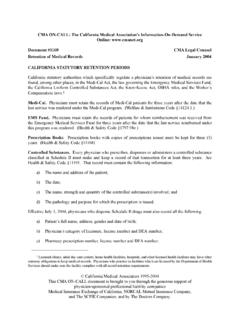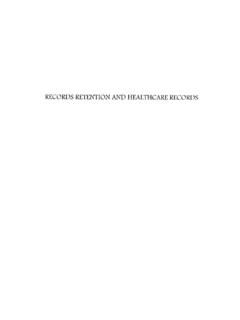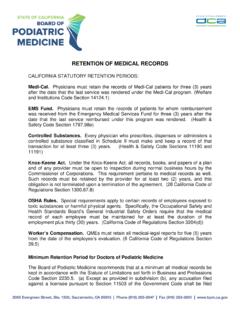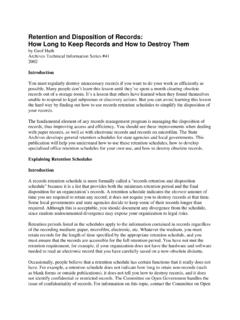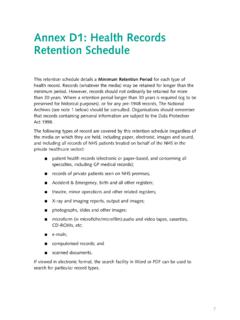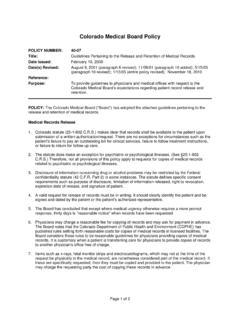Transcription of 2014 - ismiemutual.com
1 And guidance for physicians provided by the Illinois State medical Society2014201420142014A Physician s Guide to medical record Access and and ISMIE Mutual guidance: This is for educational purposes and is neither intended as nor should be considered legal advice or a standard of OF CONTENTSINTRODUCTION 3 medical record ACCESS 4 Authorization 5 Minors of Dissolved Marriages 6 Physician Records 6 Hospital Records 7 Nursing Home Records 7 Mental Health and Developmental Disabilities 8 Genetic Testing Information 8 Workers Compensation 9 Mandated Reports to Government 9 Communicable Disease Reporting 9 Sexually Transmitted Disease Reporting 9 Child, Elder and Disabled Adult Abuse and Neglect Reporting 10 Subpoenas/Court Orders 10 medical record retention 12 Guidelines for retention 13 Other Records 15 Patient Notification 16 Purging Records 16 medical record DOCUMENTATION 17 Guidelines for Documentation 18 Charting Methods 21 Correction of Records 21 Destruction of Records and Other Materials 22 Access to medical record Resources 22 Access to medical Records of Deceased Patients 23 REFERENCES 243 INTRODUCTIONM edical record access and retention guidelines are found in many portions of the Illinois Compiled Statutes.
2 Recognizing that many physicians need detailed information regarding these issues, the Illinois State medical Society (ISMS) has produced this brochure to guide physicians so that they are in compliance with the law with respect to medical record access and medical record retention issues. Additionally, good risk management principles are included as guidelines for medical record documentation. While the content of the brochure is educational and informational in nature, it is not intended to serve as legal any questions regarding the brochure contact:Illinois State medical Society 20 North Michigan Avenue Suite 700 Chicago, Illinois 60602 Telephone: 312-782-1654 Fax: 312-782-2023 Toll Free: 1-800-782-4767A Physician s Guide toMedical record Access and RetentionISMS and ISMIE Mutual guidance: This is for educational purposes and is neither intended as nor should be considered legal advice or a standard of Oath of Hippocrates of Kos, which physicians swear by, states.
3 All that may come to my knowledge in the exercise of my profession or in daily commerce with men, which ought not to be spread abroad, I will keep secret and will never reveal. If I keep this oath faithfully, may I enjoy my life and practice my art, respected by all men and in all times; but if I swerve from it or violate it, may the reverse be my lot. In light of this oath, medical records and their content are not to be released unless a physician has:n Consent from the patient or his/her personal representative for treatment, payment or health care operations purposes1n Knowledge of an express legal exception2n An appropriate subpoena or court order3 n A written authorization from the patient or his/her personal representativeIf one of these four conditions exists, the physician may generally release a copy of the medical record in accordance with the guidelines outlined below.
4 THE ORIGINAL record SHOULD NOT BE RELEASED, EXCEPT IN RESPONSE TO A COURT ORDER OTHER THAN A SUBPOENA, OR AT THE REQUEST OF A PHYSICIAN S DEFENSE COUNSEL WHEN THE record IS NECESSARY FOR subject to release consists of all information relative to the diagnosis, treatment, prognosis, history, charts, pictures and plates, kept in connection with the treatment of a patient and payment for the treatment, whether or not it is in the patient s actual medical If records from other providers (often referred to as secondary records) are a part of the patient s entire record , then they are also subject to release regardless of any prohibition from the previous treating professional. Under HIPAA privacy rules, financial records are part of the actual medical record or protected health information (PHI) subject to record ACCESSA Physician s Guide to medical record Access and RetentionISMS and ISMIE Mutual guidance: This is for educational purposes and is neither intended as nor should be considered legal advice or a standard of who may authorize access to medical records are:n A patient who is.
5 6 18 years of age or older A minor who is, or was, married A pregnant minor A minor who is a parent A legally emancipated minor (court documents should be provided to establish emancipation) A minor, 12 years or over, seeking treatment for alcoholism, drug use, sexually transmitted diseases including AIDS and HIV, or in a family in which another family member abuses drugs or alcohol or the minor A minor seeking treatment for mental health or developmental disabilities A victim seeking treatment for sexual abuse or assault A minor seeking treatment for birth control services when the minor is married, a parent, or pregnant; has the consent of his/her parent or legal guardian; to whom failure to provide such treatment would create a serious health hazard; or who is referred for such by a physician, clergyman or planned parenthood agency7n A legal guardian n A parent n An executor of a person s estaten An attorney-in-fact, power of attorney for health care, or surrogateA physician must obtain the applicable authorization (also referred to as consent) in order to release medical information.
6 Once consent is obtained for treatment, payment, or health care operations, all subsequent treating or consulting physicians, other health care professionals, laboratories, and health care facilities may receive copies of medical records without a specific authorization,8 with the exception of records of mental health, alcoholism, drug abuse, and HIV/AIDS It is recommended that a written authorization (consent) be obtained at the first patient encounter in the office. No specific time limitations exist for an authorization or consent. This authorization or consent should be for treatment, payment, and health care operations. Under HIPAA privacy rules, a physician must offer a patient a copy of the practice s Notice of Privacy Practices and obtain acknowledgment of receipt or document refusal of the patient to sign an acknowledgement at the first patient encounter in the All this can be accomplished by obtaining the patient s signature on the appropriate form.
7 (See page 22 for specific information about accessing medical records resources, including HIPAA model policies and procedures.)All other disclosures are either mandated by law or require that the patient sign an authorization. An authorization is simply permission to disclose records. (See page 22 for specific information about accessing medical records resources, including HIPAA model policies and procedures.) Further, there are certain situations in which the duty to release or report medical information absolves the physician from the need to obtain authorization. In these cases, only the information necessary to fulfill the request or reporting obligation may be and ISMIE Mutual guidance: This is for educational purposes and is neither intended as nor should be considered legal advice or a standard of Physician s Guide to medical record Access and Retention6 Those situations include.
8 N Coroner s inquiries n Requests by a Peer Review Organization (PRO) under contract by the federal government or certain other government agencies n Workers compensation cases n Communicable disease reporting n Sexually transmitted disease reportingn Child or elder abuse reportingMinors of Dissolved MarriagesUnder the Illinois Marriage and Dissolution of Marriage Act, both the custodial and non-custodial parent has the right to have access to information and records and make health care decisions for minors in accordance with the terms of any divorce decree or custody Under an award of joint custody, each parent s rights, powers and responsibilities for the care of children, including health care matters, are specified.
9 Thus, unless the physician is given written notice of the terms of the divorce decree, if the physician is acting in good faith, he/she may assume that a parent has a right to access to health information about his/her a physician knows that a minor patient s parents are divorced, the physician may wish to ask the custodial parent whether anything is specified in the divorce decree with respect to health care. Unless specifically advised of contrary terms in a divorce decree (which the physician should see and retain a copy of) the physician is authorized to discuss these matters with any RecordsGenerally, upon written request, physicians are required by law to provide copies (or permit examination) of medical records to a patient, patient s attorney or patient s Under HIPAA privacy rules, patient health information, called protected health information (PHI), consists of medical records and billing Patients should be advised that requests for medical records will include only patient health care information, unless the patient specifically requests billing information.
10 All physicians and groups are required under the HIPAA privacy rules to establish of-fice policy regarding the release of medical Physicians practicing in groups who have seen the patient in the recent past should all be notified when a request for records has been made. From a risk manage-ment standpoint, it may be preferable for a member of the practice to review the content with a patient prior to giving copies of re-cords to that patient. Further, as a practical matter of course, physicians would be well advised to construct medical records with the thought that they will be shared with their patients, insurers, attorneys, etc., as permis-sible by law. THEREFORE, SPECIFIC TYPES OF RECORDS REQUIRING A SPECIFIC AUTHORIZATION SUCH AS RECORDS OF MENTAL HEALTH, ALCOHOLISM, DRUG ABUSE AND HIV/AIDS TREATMENT A Physician s Guide to medical record Access and RetentionISMS and ISMIE Mutual guidance: This is for educational purposes and is neither intended as nor should be considered legal advice or a standard of BE KEPT IN A SEPARATE OR SEPARABLE PORTION OF A medical record .
